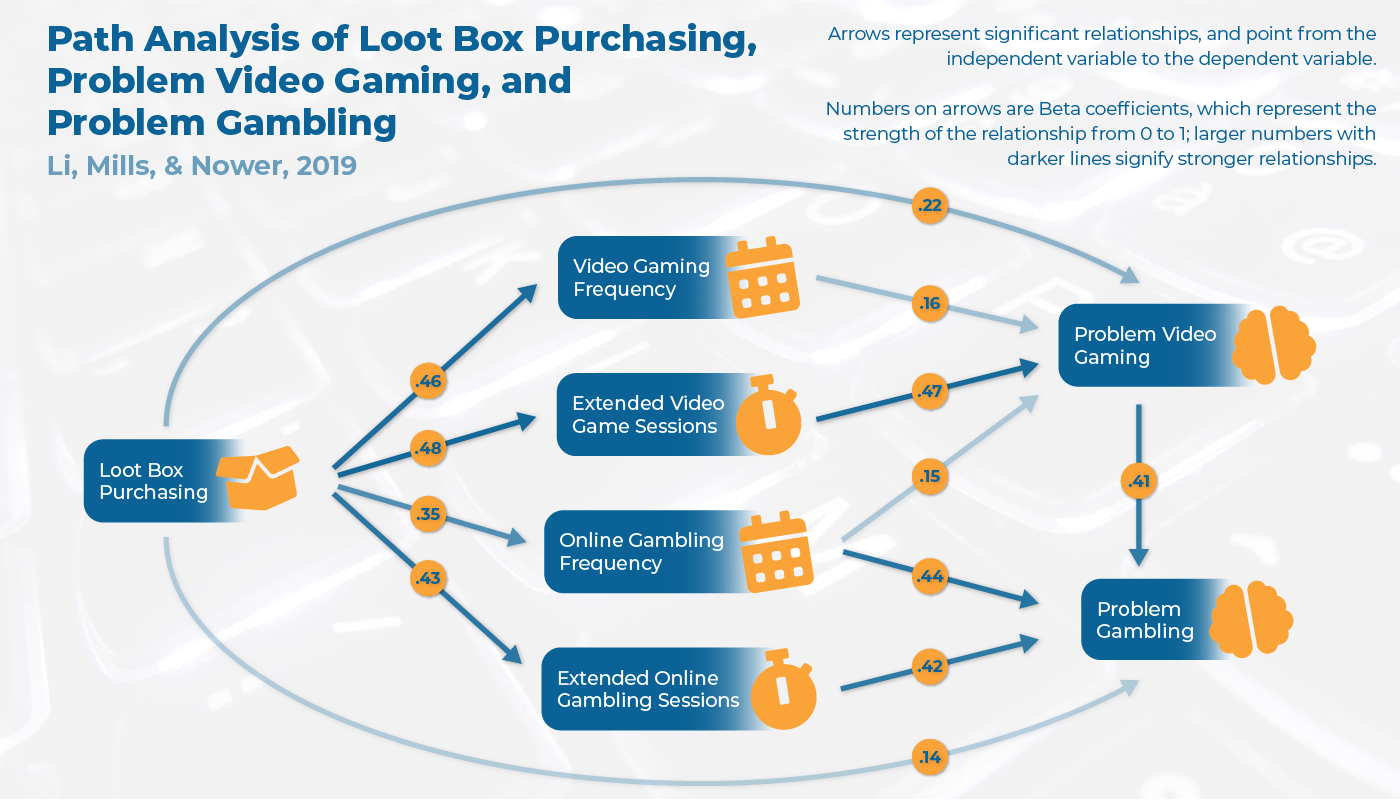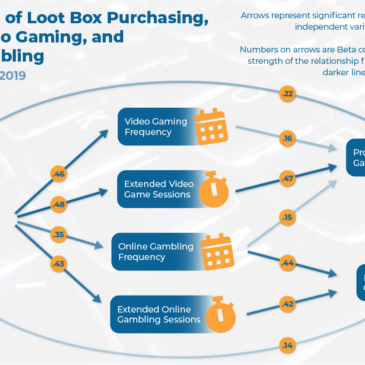Problem gambling and video gaming might be related to each other because of the similarities between activities. However, loot boxes bring this relationship to an entirely new level. Loot boxes are items that players purchase with real currency for a chance to win in-game rewards. Like slot machines, loot boxes often offer valuable content but do not disclose the chances of winning, and even manipulate their payouts based on player activity. This week, The WAGER reviews a study by Wen Li, Devin Mills, and Lia Nower that investigated whether loot box purchasing is associated with problematic video gaming and gambling.
What was the research question?
Are loot box purchases related to problem gambling and problem video gaming?
What did the researchers do?
The researchers recruited a convenience sample of 618 adult video game players from online gaming forums, online research panels, and gaming clubs at a university in the United States. Participants took an online survey that asked about how much they played video games, gambled online, and spent on loot boxes in the past 12 months. The researchers considered these patterns to be independent variables. The survey also assessed for problem video gaming behavior and problem gambling behavior in the past 12 months; the researchers considered these to be dependent variables. Li and colleagues used chi-square tests, t-tests, and path analysis to examine how loot box purchasing relates to problem gambling, and problem video gaming.1
What did they find?
Out of all participants, 44% purchased loot boxes in the past 12 months. Those who purchased loot boxes reported significantly higher levels of internet gaming disorder and gambling disorder severity than those who did not. The researchers tested a model to clarify how loot box purchasing relates to problem gambling and found multiple significant correlations among different variables. Notably, loot box purchasing was most strongly associated with frequency and extended session length of online gambling and video gaming, and symptoms of problematic online gambling were strongly linked to problem gambling (see figure).
 Figure: Results from a path analysis testing a model of loot box purchasing relating to symptoms of problem gambling and video gaming. An extended session was defined as gaming/gambling for seven hours or more in a single session. Click image to enlarge.
Figure: Results from a path analysis testing a model of loot box purchasing relating to symptoms of problem gambling and video gaming. An extended session was defined as gaming/gambling for seven hours or more in a single session. Click image to enlarge.
Why do these findings matter?
These findings highlight a problematic relationship between loot boxes and harmful patterns of gambing and gaming. Loot boxes have cemented gambling into mainstream video gaming, exposing vulnerable populations to a potential object of addiction. Maybe most importantly, adolescents can purchase loot boxes before they are capable of making responsible monetary decisions. A few countries have taken steps to limit the effect of loot boxes on children, but loot boxes remain largely unregulated and a major source of revenue for the gaming industry.
Every study has limitations. What are the limitations in this study?
The researchers used a convenience sample consisting primarily of forum users and university students, which limits external validity. Though path analysis tests the plausibility of a causal model, cross sectional methods cannot not prove which variables cause others for certain. Future research can clarify whether gaming/gambling problems motivate players to purchase loot boxes or whether loot boxes initiate and/or worsen these problems.
For more information:
Are you or someone you know experiencing problems with gambling? Visit the National Council on Problem Gambling for screening tools and resources. For additional resources, including gambling and self-help tools, visit The BASIS Addiction Resources page.
We also recognize that the holidays can be difficult for many people. Visit our Addiction Resources page for screening information or call SAMHSA’s National Addiction Helpline at 1-800-662-HELP (4357) to learn about treatment and referral opportunities.
— Jamie Juviler
What do you think? Please use the comment link below to provide feedback on this article.
________________
1. Li and colleagues controlled for participants’ age and gender in all analyses.




